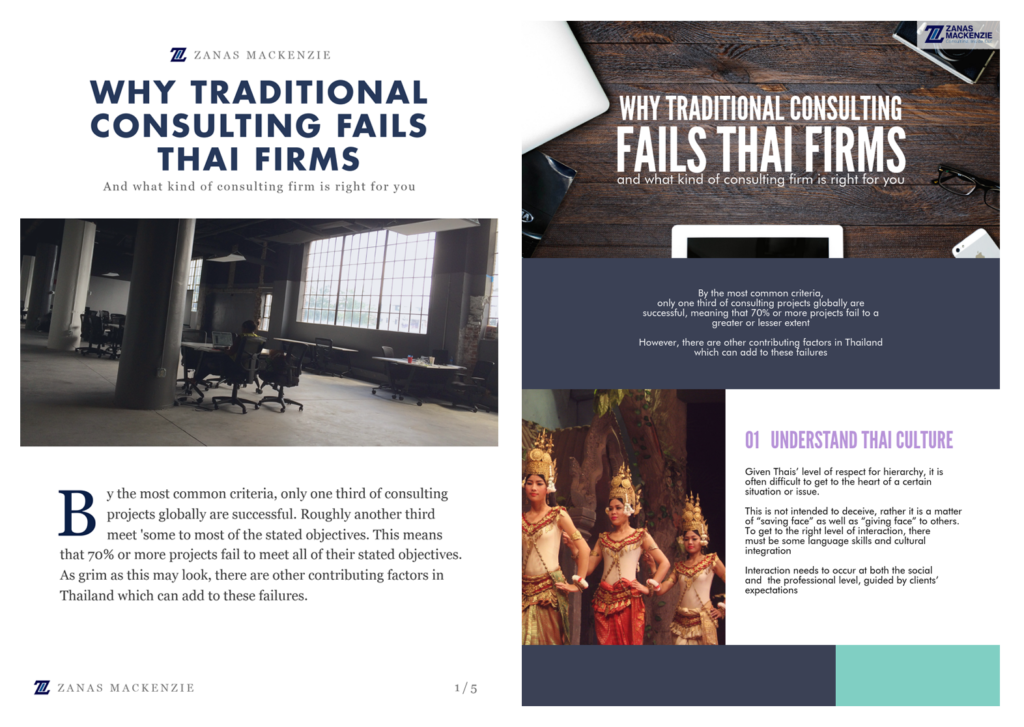Why traditional Consulting Fails Thai Firms
And what kind of consulting firm is right for you
By the most common criteria, only one third of consulting projects globally are successful. Roughly another third meet ‘some to most’ of the stated objectives. This means that 70% or more projects fail to meet all of their stated objectives. As grim as this may look, there are other contributing factors in Thailand which can add to these failures.
Thai Culture: This is an enormous hurdle to overcome for foreigners working in traditional consulting firms. Expat consultants are often on assignment or rotation, or brought in as visiting experts without attention to cultural fit and understanding. We have found that Thais are actually more open to collaborate with foreign team-members who have a vested interest in their country (i.e., residents, not expats), and who have a more refined understanding of how Thai society is knit together and how it operates.
Given Thais’ level of respect for hierarchy, it is often difficult to get to the heart of a certain situation or issue. This is not intended to deceive, rather it is a matter of “saving face” as well as “giving face” to others. To get to the right level of interaction, there must be some language skills and cultural integration (more on this below). Interaction needs to occur at both the social and the professional level, guided by clients’ expectations. Compared to Westerners, Thai people spend significantly more time with their colleagues after work hours. And the lines between work and personal are less distinct.
“Given Thais’ level of respect for hierarchy, it is often difficult to get to the heart of a certain situation or issue. This is not intended to deceive, rather it is a matter of “saving face” as well as “giving face” to others.”
Approach: Traditional consulting firms often use a “big-bang” approach to address many or all of a client’s issues and problems. There are many reasons for this, some good, and some bad. Much has to do with consultants’ standard thinking about client expectations, and even more has to do with the operating model of the consultants and their profit expectations. Asians, in general, and Thai people in particular, have an aversion to large, all-in-one projects. Better to see slices that are easy to understand and chew off, and observe their success and results, than sign up for the whole menu.
Expectations of client and consultant are often mismatched. Clients expect a clear, complete, gated roadmap and timeline to address their issues before even starting the first phase, and of course at no or low cost.
By contrast, Consultants often have not invested enough pre-sales or business analysis cost to provide that level of detail, or they expect to get fully paid for it. Add intellectual property and copyright issues into the mix, and it is easy to see how things can go astray.
Language: This is important in any culture, but we should not forget that the English language capability of many Thai people is rudimentary. Of course, most Thai leaders have studied abroad or have perfected their English in other ways. Also, the language skills of university graduates are improving and they are finding their way into entry level positions everywhere. However, in between these two layers is still a vast number of people who find English language and comprehension a challenge. Consultants must take responsibility to ensure that communication and translation occur regularly and effectively at all levels.
Fees/Cost: Most traditional consulting fees are based on pyramid/leverage and utilization models. Frankly, these are too high for all except the largest Thai companies to absorb over the long term.
In addition, traditional consulting’s risk tolerance and risk management philosophy prevents them from finding creative solutions to counteract this. Which leaves room for agile, dynamic small consulting firms to fill this void. At Zanas MacKenzie, our response is an approach we like to call Consulting Inside Out
What Should I Look For To Mitigate This Risk?
You will want a consulting firm with the following qualities and characteristics:
- Local – located and rooted in Thailand and familiar with Thai culture and the way things work here
- Flexible – demonstrating that they are keenly aware of your expectations and how you like to conduct business, to help you improve. At your speed and at your appetite
- Partners – to accommodate your culture, working hours, expectations, and with a business and risk sharing model which suits your needs
- Affordable – able to work with you within your budget and your expectations, one successful step at a time
Above all, you will want someone you can trust. Who lives and works where you live and work. Who understands what is possible in your environment. And who can be available for you when you need them. It might just be the difference between failure and success.
Spread the word
Co-founder and Managing Director

Patriek has more than 30 years of working with consulting and technology giants (Andersen, Unisys, IBM) and start-ups in many industries across three continents. He has been in Asia since 2005. First in mainland China, Taiwan, and Hong Kong. Since 2012, he lives and works in Thailand, with extensive work experience and responsibility for South East Asia.
As a result of all of these experiences, Patriek’s passion for helping companies embrace and benefit from change led him to create a new company with a unique approach to unlocking value.
Patriek focuses on operational strategy and change management. He obsesses about delivering value from within through business transformation and integration. At Zanas MacKenzie, Patriek is primarily responsible for business strategy and business development.
Free White Paper & Infographic




